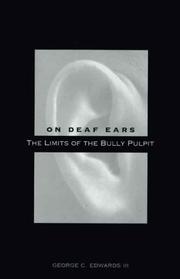| Listing 1 - 2 of 2 |
Sort by
|

ISBN: 9786611722944 1281722944 0300133626 9780300133622 0300115814 9780300115819 9780300100099 0300100094 9780300115819 6611722947 9781281722942 Year: 2003 Publisher: New Haven : Yale University Press,
Abstract | Keywords | Export | Availability | Bookmark
 Loading...
Loading...Choose an application
- Reference Manager
- EndNote
- RefWorks (Direct export to RefWorks)
American presidents often engage in intensive campaigns to obtain public support for their policy initiatives. This core strategy for governing is based on the premise that if presidents are skilled enough to exploit the "bully pulpit," they can successfully persuade or even mobilize public opinion on behalf of their legislative goals. In this book, George Edwards analyzes the results of hundreds of public opinion polls from recent presidencies to assess the success of these efforts. Surprisingly, he finds that presidents typically are not able to change public opinion; even great communicators usually fail to obtain the public's support for their high-priority initiatives. Focusing on presidents' personae, their messages, and the American public, he explains why presidents are often unable to move public opinion and suggests that their efforts to do so may be counterproductive. Edwards argues that shoring up previously existing support is the principal benefit of going public and that "staying private"-negotiating quietly with elites-may often be more conducive to a president's legislative success.
Communication in politics --- Rhetoric --- Presidents --- Public opinion --- Presidency --- Heads of state --- Executive power --- Political aspects --- History --- Public opinion.

ISBN: 1281722928 9786611722920 0300133618 9780300133615 0300100604 9780300100600 9781281722928 9780300100600 0300100604 Year: 2004 Publisher: New Haven, Conn. : Yale University Press,
Abstract | Keywords | Export | Availability | Bookmark
 Loading...
Loading...Choose an application
- Reference Manager
- EndNote
- RefWorks (Direct export to RefWorks)
Americans currently choose their president through the electoral college, an extraordinarily complex mechanism that may elect a candidate who does not receive the most votes. In this provocative book, George Edwards III argues that-contrary to what supporters of the electoral college claim-there is no real justification for a system that might violate majority rule. Drawing on systematic data, Edwards finds that the electoral college does not protect the interests of small states or racial minorities, does not provide presidents with effective coalitions for governing, and does little to protect the American polity from the alleged harms of direct election of the president. In fact, the electoral college distorts the presidential campaign so that candidates ignore most small states and some large ones and pay little attention to minorities, and it encourages third parties to run presidential candidates and discourages party competition in many states. Edwards demonstrates effectively that direct election of the president without a runoff maximizes political equality and eliminates the distortions in the political system caused by the electoral college.
Electoral college --- Presidents --- Election. --- Election --- United States
| Listing 1 - 2 of 2 |
Sort by
|

 Search
Search Feedback
Feedback About UniCat
About UniCat  Help
Help News
News